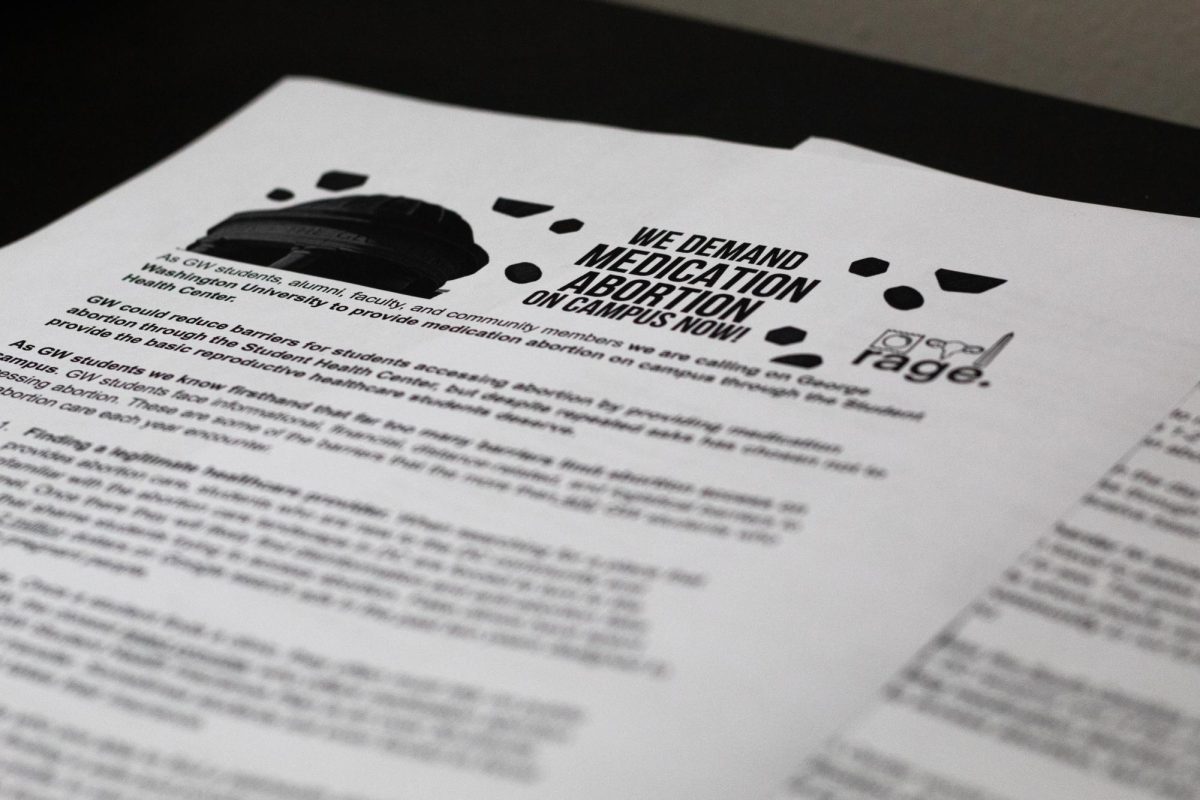More than 600 people have signed a petition calling on officials to offer abortion pills through the Student Health Center, the reproductive justice student organization that launched the form says.
GW Reproductive Autonomy and Gender Equity launched the petition Friday, asking officials to provide medication abortion — also called the abortion pill — on campus after “repeated requests” have garnered no results. The petition states that GW has a responsibility to offer abortion pills for its students and anyone else seeking abortion care because D.C. is one of the few remaining places where people can receive abortions near the southern United States in the wake of the Dobbs v. Jackson Supreme Court decision, which overturned federal abortion protections in June 2022.
Though the petition’s number of signatures is not publicly available because GW RAGE launched the appeal via a Google Form, the organization’s leaders said the petition reached more than 500 signatures in its first 24 hours and has surpassed 600 signatories as of Sunday. D.C. legislation mandates that the District remains a “human rights sanctuary” for people seeking abortions from states with restricted access, like South Carolina, which bans abortion after six weeks, and West Virginia, where abortion is completely banned with limited exceptions.
“The growing burden on abortion providers necessitates creating new access points where people can access abortion care,” the petition states. “GW has a responsibility as a member of the DC community to not further burden abortion providers in the area struggling to meet the demand.”
The petition asks respondents for their name, email, affiliation with GW and includes an optional field for signatories to elaborate on why they support abortion pills on campus.
The petition lists six “barriers” to accessing abortion after the Dobbs ruling, including finding legitimate health care providers, transportation to a clinic, a lack of private spaces, cost, wait times and the presence of protesters outside of clinics.
“Providing medication abortion on campus in the Student Health Center would reduce these barriers for students and would destigmatize abortion care,” the petition states.
Colleges in the U.S. that provide or plan to offer medication abortion through their health centers include all 33 universities in California, public universities in New York and Massachusetts and private schools like Barnard College and The New School.
“Given the abortion laws in D.C., GW easily and legally could add medication abortion to the services the Student Health Center provides,” the petition states.
Abortion is legal in D.C. and there is no limit to when someone can receive an abortion based on gestational age, according to the Office of the Attorney General for the District of Columbia. Minors seeking abortion also do not need permission from guardians and there are no mandatory waiting periods in place to get an abortion.
Maddy Niziolek, a second-year graduate student and one of RAGE’s co-presidents, said the group started conversations with the University last semester about offering abortion pills through the SHC, which officials refused. She said they have since tried to contact University President Ellen Granberg via a website submission form in August but received no response. She said last semester, Rebekka Christie, the medical director at the SHC, told RAGE members that officials would need an ultrasound machine in order to provide the medication.
“They talked about wanting an ultrasound machine, which D.C. law does not have an ultrasound requirement for medication abortion, and you can get the medication abortion through Telehealth, so without ever seeing a provider face to face, so we’re not entirely sure where that requirement came from,” Niziolek said.
D.C. follows the U.S. Food and Drug Administration’s authorization of legal prescription of abortion pills until up to 10 weeks of pregnancy, and does not specify the need for an ultrasound machine in order to provide the medication. Planned Parenthood provides medication abortion for up to 11 weeks through clinic appointments and up to 10 weeks and four days through video conference appointments.
The Planned Parenthood in NoMA, which is about a 30-minute ride on the Metro from GW, is currently the closest listed medication abortion provider that takes GW’s Student Health Insurance Plan. The particular location offers abortion pills for $578, according to the website.
Niziolek said she hopes that the petition inspires officials to see that the larger community wants the SHC to provide abortion pills, not just “a couple” of students in RAGE.
“We definitely hope that if they saw that this is something that a lot of students are demanding and would like to see that they would listen to that demand and would maybe reconsider their decision,” Niziolek said.





